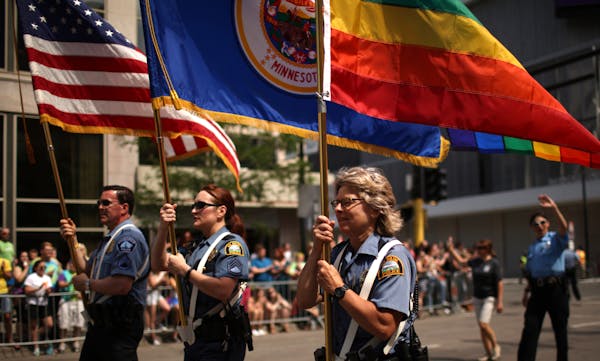Minneapolis Police Chief Janeé Harteau on Thursday publicly expressed her frustration with Twin Cities Pride's decision to bar uniformed police officers from marching in Sunday's parade, calling the move "divisive."
Harteau wasn't alone in her reaction, with many saying that a group that has long championed inclusivity was showing hypocrisy in banning a whole profession.
Pride officials asked officers not to march in the parade after a Ramsey County jury's acquittal last week of officer Jeronimo Yanez in the fatal shooting of Philando Castile. But that may not be the last word on the matter. Parade organizers met Thursday evening to discuss whether to reverse the ban, with a decision likely to be made public Friday morning.
In a letter Thursday to Pride Executive Director Dot Belstler, Harteau wrote that she understood the "magnitude of recent events" and offered to sit down with Belstler to discuss "how we can work together in the coming months to make sure everyone feels both safe and welcome."
"I am beyond disappointed that you didn't feel you could talk with me before making such a divisive decision that has really hurt so many in our community, including the LGBTQ members of this Department (and their family members)," wrote Harteau, the city's first lesbian police chief. Harteau, who served as the parade's grand marshal three years ago, called the decision "divisive" at a time when the police were trying to mend fractured ties with marginalized communities.
"I really struggle to see how this decision helps our community heal, and the message of division and not inclusion is hurtful to many of us," she wrote. "Police officers are more than just officers, they are human beings with families who are also part of this community."
She later tweeted: "It's time to be lifting each other up, not excluding one another. Saddened to be shut out from Pride. Will I be welcomed next year?"
The decision to exclude police officers from the parade also drew a strong public reaction on social media, with some applauding the chief for challenging the decision and others urging her to work to change the department's culture.
Harteau responded Thursday to some of her critics.
"Sad you believe that," Harteau wrote to one user who asked her not to attend Pride and called her "dangerous." "I have spent my life protecting people from harm and discrimination. You???"
In St. Paul, Deputy Police Chief Mary Nash said she was disappointed and frustrated by the decision. Nash, the department's LGBTQ liaison, said 12 to 25 St. Paul officers have participated in previous years.
"If your organization is about love and acceptance ... it's kinda ironic," Nash said. "Members of the LGBTQ cross a lot of occupations. There's a lot of good cops every day trying to do the right thing."
A painful division
Jana Shortal, a KARE 11 reporter and grand marshal of this year's parade, said she could see both sides.
On the one hand, she said, "some people have had bad experiences with bad apples in the police department," while adding that the event has always been a celebration of inclusivity.
"Pride is about being inclusive, so to exclude people just felt antithetical to who we are," Shortal said. "I'm empathetic to people in the community that are hurting, and I'm empathetic to the officers who felt excluded."
The annual parade, which draws about 350,000 people, has started in previous years with several marked squad cars and uniformed police officers leading the procession down Hennepin Avenue through downtown Minneapolis.
This year, organizers said, there will be only one unmarked police car — mandated for safety reasons — at the front of the parade. There will be "limited police participation in the parade itself," Twin Cities Pride said in a statement. And there will be fewer police officers in uniform compared to last year, when Minneapolis police increased their patrol after a massacre at a gay nightclub in Orlando.
Twin Cities Pride Board Chairwoman Darcie Baumann said Wednesday that the organization did not intend to "hurt or harm or make anyone feel excluded."
"Unfortunately, we have hurt and offended the LGBTQ police officers, and that was not at all our intent," Baumann said. "But in the wake of the verdict, we want to be sensitive to the population that is grieving ... and seeing those uniforms brings angst and tension and the feeling of unrest."

Jill Biden travels to Minnesota to campaign for Biden-Harris ticket
Want to celebrate 4/20? Here are 33 weed-themed events across Minnesota.

Legendary record store site in Minneapolis will soon house a new shop for musicheads

Former Gov. Jesse Ventura boasts he could beat unpopular Trump or Biden if he ran for president

